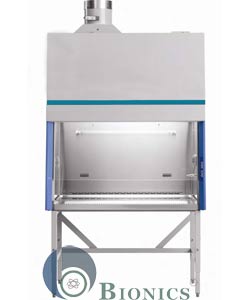How Much Do You Know About Class 2 Biosafety Cabinets?
How Much Do You Know About Class 2 Biosafety Cabinets?
Blog Article
Enhancing Laboratory Safety with Class 2 Biosafety Cabinets and Microbiological Protection

In today’s scientific and clinical labs, safety for personnel and samples is non-negotiable. Whether it's conducting biological tests, diagnostics, or experiments with infectious agents, biosafety cabinets play an integral role in contamination prevention and sample integrity.
Among the available options, Class 2 Biosafety Cabinets stand out for their balanced protection. These units are crucial for working with moderate-risk organisms and sensitive samples.
Understanding Biosafety Cabinets
Biosafety cabinets are specially designed, enclosed systems that ventilate and filter lab air. They use HEPA filtration to remove contaminants from incoming and outgoing air.
These units are generally classified into three categories—Class I, Class II, and Class III. Among these, Class II units strike a balance between user, product, and environmental protection.
Why Class II Cabinets Are the Preferred Choice in Labs
Class 2 Biosafety Cabinets are designed to safeguard three aspects: the operator, the sample, and the environment. They utilise downward laminar airflow within a sealed system.
Contaminated air is drawn into the cabinet and filtered through HEPA systems before recirculation or exhaust. These cabinets are ideal for work involving moderate-risk pathogens (BSL-2/3).
What Makes Class 2 Cabinets Effective in Labs
A Class 2 microbiological safety cabinet includes several critical technologies such as:
• HEPA/ULPA filtration to trap microbes and particles
• Steady air movement to reduce airborne particle circulation
• Negative pressure barriers to prevent leakage
• Optional UV lights for overnight sterilisation
• Noise-reducing construction for better working conditions
• Transparent sash or viewing window microbiological safety cabinet for easy access and monitoring
These elements create a clean, contained, and user-friendly workspace.
Industries and Labs That Rely on Microbiological Safety Cabinets
Class 2 Biosafety Cabinets are key equipment in healthcare, molecular biology, and quality control. They are indispensable for handling clinical specimens, blood cultures, and biological reagents.
Hospitals, research labs, and manufacturing units depend on these cabinets for contamination control.
Benefits of Using Class 2 Biosafety Cabinets
Using Class 2 cabinets offers significant improvements in contamination control and user safety:
• Protects the integrity of lab work
• Shields operators from harmful aerosols and pathogens
• Improves environmental safety by filtering outgoing air
These cabinets combine safety features with operational efficiency.
Cabinet Types and Global Compliance
Top manufacturers design units compliant with major biosafety regulations worldwide. Class 2 units are sub-classified as A1, A2, B1, and B2—with each type offering different air handling systems.
• Type A2: Recirculates 70% and exhausts 30% of filtered air
• Type B2: Suited for labs dealing with toxic agents
Selecting the right configuration ensures compliance and safety.
Choosing the Right Biosafety Cabinet
Before purchasing, consider:
• The biosafety level required (BSL-1, BSL-2, or BSL-3)
• Available lab space and utility infrastructure
• Ease of use, energy efficiency, and upkeep
• Manufacturer reputation and post-sale support
Working with reliable manufacturers provides peace of mind and technical guidance.
Best Practices for Using Class II Biosafety Cabinets
For optimal results:
• Install the cabinet in a draft-free, low-traffic zone
• Get periodic validation from certified technicians
• Educate staff on cabinet operations and safety
Operational best practices include:
• Maintain biosafety gear protocols
• Minimise hand movements inside the cabinet
• Clean all contact points post-operation
• Treat UV usage as an overnight sterilisation method
Why Class 2 Cabinets Are a Must-Have in Labs
Class 2 biosafety cabinets are essential for labs that value safety, precision, and cleanliness. They ensure contamination-free experiments and personnel safety.
From clinical research to vaccine development, Class II cabinets support world-class laboratory practices. When investing in a biosafety cabinet, prioritise compliance, usability, and long-term support—because safe science starts with smart containment. Report this page